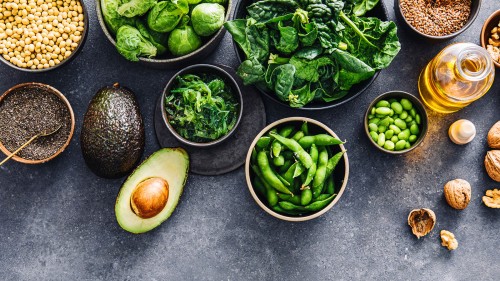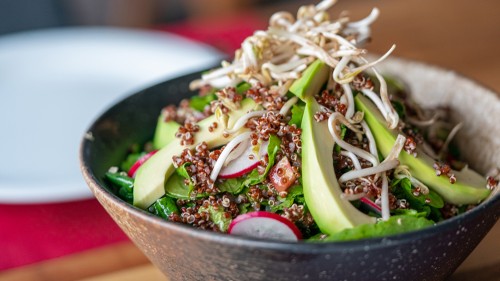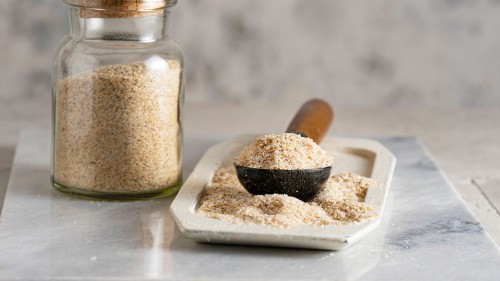WellnessVerge is reader-supported. We may earn a commission when you make a purchase through the links on this page. Learn more about our process here.
Best Fiber Supplements of 2023, According to Dietitians
Last Updated on December 26, 2022
Medically Reviewed by Ana Reisdorf, MS, RD
With all of the choices on the market, finding a fiber supplement to meet your needs may feel overwhelming. The key to choosing the best fiber supplement is to ensure you pick the right type of fiber to help with your specific health needs.

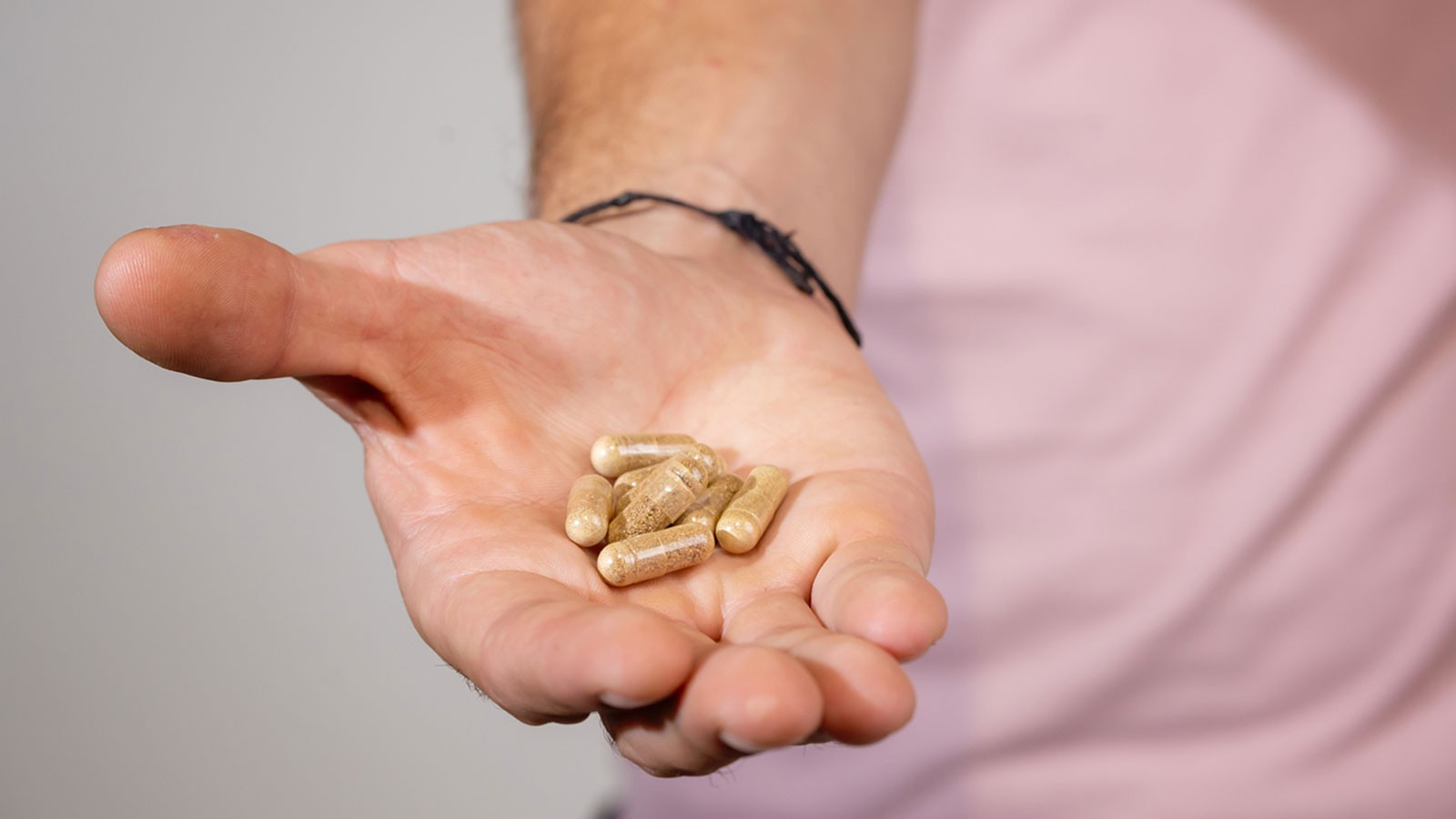
Summary of Our Picks
- Best overall: Garden of Life Organic Raw Fiber Powder
- Best for constipation: Garden of Life Super Seed Powder and Viva Naturals Organic Psyllium Husk Powder
- Best for diarrhea: Sari Foods Organic Acacia Fiber Powder and NOW Foods Psyllium Husk Caps
- Best for IBS: Heather’s Tummy Care Organic Tummy Fiber Acacia Senegal and Thorne FiberMend
- Best gummy: Viteey Fiber Prebiotic Pectin Gummies and Nature Made Fiber Gummies
How We Chose These Brands
To narrow down our choices for the best fiber supplements, we evaluated each brand based on the following factors:
- Brand Reputation: Does the brand have a long and good-standing reputation in the industry? Are the products made in a certified Good Manufacturing Practices facility?
- Professional Involvement: Are there healthcare professionals involved with research and development?
- Supported by Research: Is the brand committed to research?
- Price: Is the price of the product comparable to other similar products?
Health Benefits of Fiber
Before we dive into our selections, let’s briefly review the health benefits of getting enough fiber and the value of fiber supplementation.
Fiber refers to the part of plant-based foods that your body is unable to digest. But, despite its inability to be digested, fiber can provide many benefits as it passes through your digestive tract.
Fiber is most known for its role in regulating your digestive system.
However, the need for adequate fiber doesn’t stop there. Eating enough fiber may also play a role in supporting your overall health and well-being.
The health benefits of fiber include: (1)
- Preventing and treating constipation. Fiber can add bulk to your digestive tract and help stimulate your intestines to help keep you regular. Adequate fiber intake can often prevent constipation, a common condition affecting up to 20% of adults in the United States. (2)
- Enhancing blood sugar control. Adequate fiber intake can improve your insulin sensitivity and stabilize your blood sugars, reducing the risk of type 2 diabetes.
- Promoting cardiovascular health. Fiber plays a role in reducing your risk of cardiovascular disease by improving cholesterol levels.
- Reducing the risk of gastrointestinal cancers. Eating enough fiber may help prevent the risk of certain cancers, especially colorectal cancers. (3)
According to the 2020–2025 Dietary Guidelines for Americans, the recommendation for daily fiber intake includes the following: (4)
| Under 50 years | Over 50 years | |
|---|---|---|
| Women | 25 grams | 21 grams |
| Men | 38 grams | 30 grams |
Based on one 2017 study, however, an estimated 95% of Americans don’t meet the recommended daily fiber intake. The average daily fiber intake is estimated to be roughly 16 grams per day. (5)
The best way to meet the recommended dietary fiber intake is to eat it through a healthy and balanced diet rich in fruits, vegetables, beans, legumes, whole grains, nuts, and seeds.
However, if you’re like the many people struggling to meet their daily fiber intake recommendations, you may be considering the use of a fiber supplement.
Dietary fiber supplements have increased in popularity as they offer a convenient and concentrated source of fiber for those falling short of the recommendations.
Fiber supplements will contain a specific type of fiber or a mix of different fibers. These fibers will include soluble and insoluble fiber.
- Soluble Fiber: Can absorb water and slow down the movement of food through the digestive tract. If you’re looking to ease diarrhea, soluble fiber can help solidify watery stools. It may also help lower your cholesterol levels and improve blood sugar control.
- Insoluble Fiber: Has the opposite effect as soluble fiber. It doesn’t absorb water, so it helps accelerate the movement of food through your digestive tract. Due to its laxative effect, insoluble fiber can prevent and reduce constipation.
Fiber supplements often contain one or both of these types of fibers as well as other ingredients that may help improve your digestion and overall health.
Choosing the best fiber supplement to meet your needs involves knowing which type of fiber will help your specific health condition. (We discuss the different types of fibers you may see in a supplement under “Things to Consider When Shopping for a Fiber Supplement” below.)
Our list includes fiber supplements that may help with common health conditions such as constipation, diarrhea, and IBS, as well as your overall health.
Best Overall
Top Pick: Garden of Life Organic Raw Fiber Powder
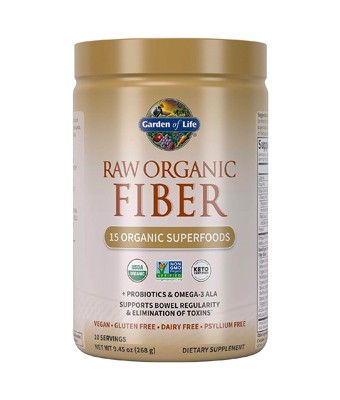
Pros
- Includes both soluble and insoluble fiber
- Third-party tested
- Includes probiotics, prebiotics, and omega-3 fatty acids
Cons
- Slightly more expensive than some similar products
- May have a gritty texture
Our Take
Garden of Life Organic Raw Fiber Powder is a quality fiber supplement that provides both soluble and insoluble fiber. It is organic and third-party tested but is priced higher than some other fiber supplements.
Garden of Life Raw Organic Fiber is an organic fiber supplement that contains a mix of both soluble and insoluble fiber.
A blend of both soluble and insoluble can help relieve constipation as insoluble fiber will add bulk to your stools and increase transit time. Soluble fiber will help absorb water and can lubricate your intestinal tract.
The product also contains other ingredients like probiotics and omega-3 fatty acids, which may benefit your gut health and also support your health and general wellbeing.
This product is unflavored, gluten-free, Certified USDA Organic, non-GMO Project Verified, vegan, dairy-free, and sugar-free. It is free of artificial sweeteners and preservatives and is also third-party tested.
One tablespoon of the powder provides a total of 5 grams of fiber, 4 grams of soluble fiber, and 1 gram of insoluble fiber. The product won’t thicken a beverage like other fiber powders.
Instructions for Use: 1 scoop of Garden of Life Raw Organic Fiber can be mixed with water, a smoothie, juice, or yogurt one or more times per day as needed.
Cost: A one-month supply is $25.89 on Amazon. If purchased on their website, Garden of Life offers a 30-day return policy.
Best for Constipation
Top Pick: Garden of Life Super Seed Powder
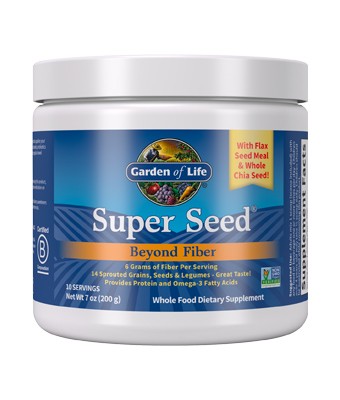
Pros
- Contains both soluble and insoluble fiber
- Third-party tested
- Contains protein, omega-3 fatty acids, probiotics, and enzymes
Cons
- More expensive than some other fiber supplements
- May have a gritty texture
Our Take
Garden of Life Super Seed Powder provides both soluble and insoluble fiber sourced from whole foods. The product is organic and third-party tested but is more expensive than other fiber supplements.
The best fiber supplements for constipation will provide a blend of soluble and insoluble fibers.
Insoluble fiber will add bulk to your stool and increase transit time. Soluble fiber can help stool pass through your gastrointestinal tract by absorbing water and lubricating your intestinal tract.
Garden of Life Super Seed Powder contains both soluble and insoluble fiber derived from whole-food sources like sprouted seeds, grains, and legumes.
The product is specifically designed to ease constipation and provides 6 grams of fiber, 6 grams of protein, healthy omega-3 fatty acids, and beneficial probiotics and enzymes in each serving.
It is certified vegan, USDA-organic, non-GMO, gluten-free, and third-party tested.
Instructions for Use: One scoop of Garden of Life Super Seed can be mixed with water or a beverage of your choice one or more times per day as needed.
Cost: A 1-month supply is $20.18 on Amazon, and you can save 15% with Subscribe & Save. If purchased on their website, Garden of Life offers a 30-day return policy.
Runner-Up: Viva Naturals Organic Psyllium Husk Powder
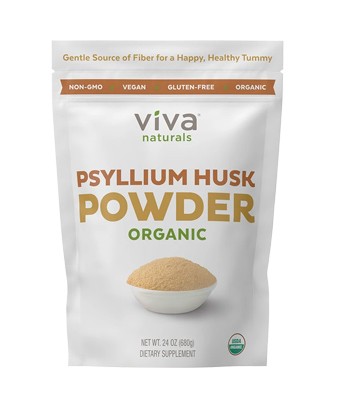
Pros
- Contains both soluble and insoluble fiber
- Third-party tested
- Reasonably priced
Cons
- May contain peanuts and tree nuts
- Drinks can become thick and gel-like
Our Take
Viva Naturals Organic Psyllium Husk Powder is a very reasonably priced, high-quality fiber supplement. It is not suitable for people with peanut or tree nut allergies and may become thick and gel-like after mixing into a beverage.
This supplement is another good option if you’re looking for relief from occasional constipation and irregularity.
The product provides 4 grams of both soluble and insoluble fiber per serving, which can help bulk up your stools and increase transit time.
It is USDA-certified organic, non-GMO, gluten-free, and third-party tested. Unfortunately, the powder may contain peanuts and tree nuts, so it isn’t suitable for people with a nut allergy.
Instructions for Use: One teaspoon of Viva Naturals Psyllium Husk should be mixed with 8 ounces of any liquid and taken once per day.
Cost: The product is also very reasonably priced. On Amazon, it is $17.99 for a 1.5-pound bag of 136 servings (serving size is 1 teaspoon). The company provides a 90-day return policy if purchased through their website.
Best for Diarrhea
Top Pick: Sari Foods Organic Acacia Fiber Powder
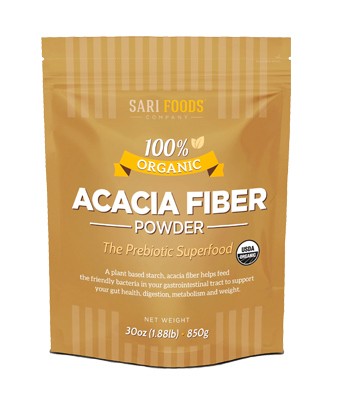
Pros
- May ease diarrhea, gas, and bloating
- Third-party tested
- Organic, gluten-free, and vegan
Cons
- May have a gritty texture
Our Take
Sari Food’s Organic Acacia Fiber Powder is a high-quality, reasonably-priced fiber supplement that may help ease diarrhea, gas, and bloating.
Acacia powder is a nice choice to help ease diarrhea. Sari Food’s product contains acacia powder, a form of soluble fiber that can absorb extra water in your GI tract and can slow down how quickly stool moves through your intestines.
This fiber powder is gentle on your system and may also help reduce gas and bloating.
It is gluten-free, non-GMO, vegan, and third-party tested and doesn’t contain any additives, colors, flavors, or sweeteners.
Instructions for Use: One heaping teaspoon of Sari Food’s acacia powder can be mixed with water or a beverage of your choice and taken once per day.
Cost: The product is also reasonably priced at around $29.97 for a 30-ounce bag of 170 servings (serving size is 1 teaspoon).
Runner-Up: NOW Foods Psyllium Husk Caps
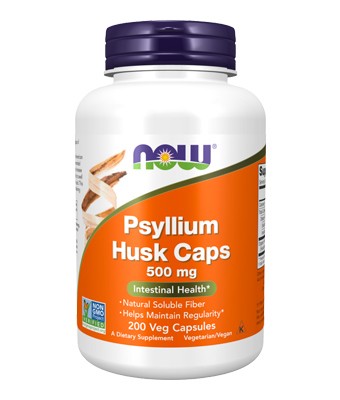
Pros
- Contains soluble fiber, which may help with diarrhea
- Third-party tested
Cons
- May need to take many capsules per day
Our Take
NOW Foods Psyllium Husk Caps provide a form of soluble fiber that may help reduce diarrhea. This high-quality product is third-party tested and reasonably priced but requires you to take 6 to 9 pills per day.
The best fiber supplements for diarrhea will contain a soluble form of fiber, which can absorb water and slow down the movement of food through the digestive tract.
NOW Foods Psyllium Husk Caps provide 1.5 grams of organic psyllium husk in each serving. The product is non-GMO, vegan, made without common allergens, and is third-party tested.
Instructions for Use: The manufacturer of NOW recommends three capsules 2 to 3 times per day, which is a lot. For people that don’t want to load up on 6 to 9 fiber pills each day, this product is probably not the best fit.
Cost: This product is reasonably priced at $20.62 for 166 servings on Amazon (serving size is 3 capsules). New, unopened items purchased through NOW Food’s website can be returned within 30 days of purchase for a full refund.
Best for IBS
Top Pick: Heather’s Tummy Care Organic Tummy Fiber Acacia Senegal
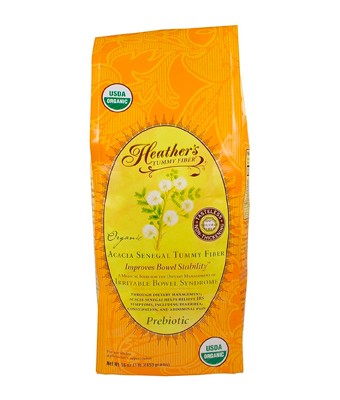
Pros
- Acacia has been shown to ease a variety of IBS symptoms
- Organic product
- Reasonably priced
Cons
- Not third-party tested
Our Take
Heather’s Tummy Care Organic Tummy Fiber Acacia Senegal is an excellent fiber supplement that may help ease IBS symptoms. The product is reasonably priced and comes with a great return policy.
This product is designed specifically for the dietary management of IBS.
It is made with acacia, a form of soluble fiber that supports bowel motility and can ease IBS-related symptoms, including diarrhea, constipation, gas, and bloating.
Acacia has a prebiotic effect that can stimulate the growth of healthy gut flora, which can reduce bloating, gas, and bowel irregularities from IBS.
Heather’s Tummy Care product is also organic, gluten-free, and is free from sugar, salt, and artificial sweeteners. It is also tasteless, non-thickening, and grit-free, making it easy to dissolve in liquids or moist foods.
Instructions for Use: To use Heather’s Tummy Care you’ll start with 1/2 level teaspoon, twice daily. The product should be added to an empty cup, then stirred with a fork as you gradually add room temperature liquid. Let rest for a minute, then stir again to completely dissolve. You can gradually increase your dose by adding an extra 1/2 teaspoon every 3–5 days until your symptoms stabilize.
Cost: This product is very reasonably priced at $16.97 for a 16-ounce bag of 180 servings (serving size is 1 level teaspoon) on Amazon. You can save 10% with Subscribe & Save. Heather’s Tummy Care has an excellent return policy with no time limit if purchased through their website. You can simply return the product for a full refund at any time, for any reason.
Runner-Up: Thorne FiberMend
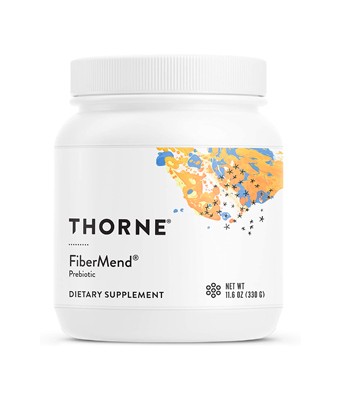
Pros
- Provides soluble fiber that is gentle enough for people with IBS
- Third-party tested
Cons
- More expensive than similar fiber supplements
Our Take
Thorne FiberMend provides a prebiotic blend of fibers that may help ease IBS symptoms. This high-quality product is higher priced than some similar fiber supplements but comes with a 60-day money-back guarantee.
This fiber supplement from Thorne provides a nice prebiotic blend of primarily soluble fiber. Its ingredients are designed to be gentle enough for people with IBS.
Soluble fiber can help ease IBS symptoms, including diarrhea, as it acts as a bulking agent to help bind stools. This prebiotic blend can also promote the growth of healthy bacteria in your GI tract.
The product contains 7 grams of fiber, 8 grams of partially hydrolyzed guar gum, and 2.5 grams of rice bran.
It’s unflavored and free from common allergens, including gluten, eggs, tree nuts, soy, yeast, and fish, and is third-party tested.
Instructions for Use: You can use Thorne’s FiberMend by mixing 1 scoop with 8 to 10 ounces of water or a beverage of your choice once per day.
Cost: A 1-month supply is $39.00 on Amazon, which is more expensive than other fiber supplements with similar properties. However, you can save 10% with Subscribe & Save. Thorne does offer a 60-day money-back guarantee on all of its products if purchased through their website.
Best Gummy
Top Pick: Viteey Fiber Prebiotic Pectin Gummies
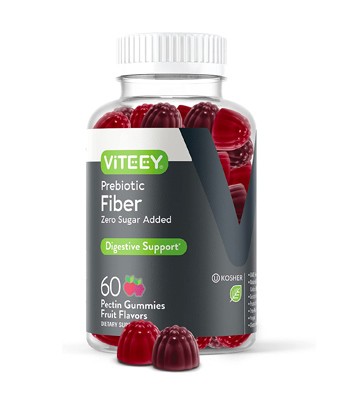
Pros
- Provide a good amount of soluble fiber per serving
- Vegan, GMO-free, gluten-free, and free of most allergens
- Reasonably priced
Cons
- Provides only one type of fiber
Our Take
Viteey Fiber Prebiotic Pectin Gummies provide a good amount of fiber per serving at a reasonable price and are suitable for vegans and people with allergies.
Each fiber gummy provides 4 grams of soluble fiber from plant-based pectin. This type of fiber may help promote the growth of healthy bacteria in your GI tract and can also ease constipation.
The gummies are vegan, GMO-free, gluten-free, contain no added sugar, and are free of most allergens.
All of Viteey’s products go through extensive lab testing to ensure accurate purity and potency in each serving.
Instructions for Use: The manufacturer suggests taking 2 gummies per day for the best results.
Cost: A 1-month supply is roughly $13.99 on Amazon (60 gummies). You can save 10% through Subscribe & Save.
Runner-Up: Nature Made Fiber Gummies
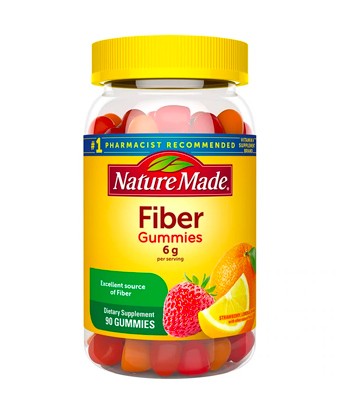
Pros
- Provides a good amount of fiber per serving
- Sweetened with monk fruit extract
Cons
- Not suitable for vegans
- Higher priced than some similar products
Our Take
Nature Made Fiber Gummies provide a good amount of fiber per serving and are sweetened with monk fruit extract. The product is not suitable for vegans and is higher priced than some similar fiber gummies.
Nature Made is a well-trusted brand that provides a quality fiber supplement.
Their gummies provide 6 grams of inulin fiber per serving. They are gluten-free, sugar-free, contain no artificial colors and flavors, and are sweetened with monk fruit extract.
While some of Nature Made’s supplements are third-party tested, this product is not.
Instructions for Use: The manufacturers of Nature Made Fiber gummies recommend taking 3 gummies per day. The product contains gelatin, so it’s not suitable for vegans.
Cost: A 1-month supply is $18.31 on Amazon.
Things to Consider When Shopping for a Fiber Supplement
When looking at a fiber supplement, you’ll see several items on the label. These may include:
- The type of fiber in the supplement
- Additional ingredients
- The number of grams of fiber the supplement provides
- Possible third-party certification
- The form of fiber, which may consist of powder, capsule, or gummy
1. The Best Type of Fiber for Your Condition
Choosing the right type of fiber to address your specific health concerns is of utmost importance.
For example, if you are looking for a supplement to help reduce diarrhea, those containing insoluble fiber may worsen your symptoms.
The following are different types of fibers you may see in a supplement:
Psyllium
Psyllium is a type of fiber derived from seed husks. It is unique because it provides a blend of both soluble and insoluble fiber.
This type of soluble fiber has been shown in clinical trials to help lower cholesterol levels, improve blood sugar control, and help you feel fuller for longer. (6)
It also appears to help ease both diarrhea and constipation and has been shown to reduce abdominal pain associated with Irritable Bowel Syndrome (IBS).
A 2014 meta-analysis evaluated dietary fiber supplementation in 14 randomized controlled trials involving 906 patients with IBS. (7)
Researchers found that fiber supplementation, particularly those with psyllium, was effective in improving IBS symptoms compared to placebo.
While the health benefits of psyllium look promising, it’s important to note that this type of fiber may cause gas and bloating for some people.
Inulin
Inulin is another type of soluble fiber often sourced from chicory root. Inulin contains prebiotics, which are plant fibers that can feed the healthy bacteria in your gut.
One small 2016 clinical trial found that inulin may help improve blood sugar control. (8)
Additionally, one older clinical trial found that older adults who supplemented their diet with supplemental inulin reported less constipation and better digestion. (9)
Methylcellulose
Methylcellulose supplements are generally 100% soluble fiber and are sometimes used to help treat constipation. (6)
This type of fiber typically comes in a powder form that is then dissolved in cold liquids.
Acacia
Acacia, also known as gum arabic and acacia, is sourced from the sap of the Acacia Senegal tree.
Some research has suggested that acacia fiber may help reduce gut inflammation, alleviate constipation, ease diarrhea, and support weight-loss efforts by helping you feel fuller for longer. (10)
Pectin
Pectin is a soluble fiber that can help soften stools and reduce symptoms of constipation.
One study found that people with constipation that took 24 grams of pectin daily had fewer symptoms of constipation and an increase of healthy bacteria in their GI tract. (11)
2. Additives
Some fiber supplements contain extra ingredients, mainly to help improve the product’s taste.
Sugar is the most common additive you’ll find in a fiber supplement.
Too much sugar in your diet can lead to additional health problems, so it’s best to select a supplement with little to no sugar. Opt for fiber supplement pills (versus gummies and powders) or unflavored options to minimize your sugar intake.
Other ingredients may include probiotics, herbs, and fatty acids, all of which are designed to further promote your health and wellbeing.
Summary
Sugar is the most common additive in fiber supplements. Look for reduced or no-sugar options to further promote your health and well-being.
3. Grams of Fiber per Serving
The amount of fiber provided in a supplement will vary from product to product. Most fiber supplements will provide anywhere from 2 grams to 6 grams of fiber per serving.
It is best to consult with your healthcare provider about the ideal product and dosage to meet your individual needs.
When starting a fiber supplement, it is best to begin with a lower dose and gradually increase it over time.
Additionally, it’s important to drink extra fluids when increasing your fiber intake to prevent constipation and other uncomfortable GI symptoms.
Summary
Most fiber supplements will provide anywhere from 2 grams to 6 grams of fiber per serving. It is important to drink plenty of fluids with a fiber supplement to reduce GI symptoms.
4. Third-Party Testing
Third-party testing companies will evaluate a supplement and confirm its quality, purity, and potency.
Some common third-party seals to look for include Consumer Labs, US Pharmacopeia (USP), and NSF International.
Since the FDA doesn’t regulate dietary supplements, this type of third-party testing ensures that the product is free of contaminants and is accurately labeled.
Summary
Look for products with third-party testing to ensure that a product is free of contaminants and is accurately labeled.
5. Form
Most fiber supplements come in powder form that needs to be dissolved in a beverage.
However, fiber capsules, fiber supplement pills, and fiber gummies may be easier to take for some people and are more suitable for travel.
Frequently Asked Questions
How much fiber should I take per day?
The recommended daily allowance (RDA) of fiber per day is 25 grams for women and 38 grams for men. (4)
Most people aren’t meeting this recommendation.
To help meet the recommended amount of fiber each day, try to add more high-fiber foods into your diet, including fresh fruits and vegetables, whole grains, beans, legumes, nuts, and seeds.
What is the best fiber supplement?
The best fiber supplement will depend on your individual health concerns.
In general, fiber supplements containing some insoluble fiber may be best for easing constipation, while soluble fiber may be better for reducing diarrhea.
Should I take a fiber supplement with food?
You can take a fiber supplement with or without food. However, it’s important that you take your fiber supplement with plenty of water to help ease GI symptoms and prevent dehydration.
What is the best time of day to take a fiber supplement?
You can take a fiber supplement at any time of day, but if you’re taking more than one capsule or gummy, you may choose to spread your intake throughout the day.
Fiber supplements may affect the absorption of certain medications and supplements. It is always best to speak with your healthcare provider to address possible interactions.
Is it okay to take a fiber supplement every day?
It is okay to take a fiber supplement every day. However, a fiber supplement shouldn’t be a substitute for a healthy, well-balanced diet.
It’s important to ensure you eat a wide variety of fiber-rich foods as they often contain other essential nutrients like vitamins, minerals, and antioxidants.
What foods are high in fiber?
Plant foods are generally high in fiber. They may include fresh fruits and vegetables, whole grains like brown rice and wild rice, whole wheat bread, beans, lentils, and seeds.
The Bottom Line
Fiber supplements are designed to help ease various gastrointestinal symptoms and may help increase the beneficial bacteria found in your gut.
Soluble fiber can help absorb water and slow down the movement of food through your digestive tract. This type of fiber may help ease diarrhea, lower your cholesterol levels, and improve blood sugar control.
Insoluble fiber doesn’t absorb water, so it helps accelerate the movement of food through your digestive tract. Due to its laxative effect, insoluble fiber may help prevent and reduce constipation.
While fiber supplements may help with some GI symptoms, it’s important to remember that they should not replace a healthy, well-balanced diet.
A healthy, well-balanced diet will provide an array of many important vitamins, minerals, and antioxidants, in addition to dietary fiber.
It is always best to consult with your healthcare provider to help decide whether fiber supplementation is best for you and your health needs.
At WellnessVerge, we only use reputable sources, including peer-reviewed medical journals and well-respected academic institutions.
- High intake of dietary fiber and whole grains associated with reduced risk of non-communicable diseases:
https://www.sciencedaily.com/releases/2019/01/190110184737.htm - Chronic Constipation in the United States: Results From a Population-Based Survey Assessing Healthcare Seeking and Use of Pharmacotherapy:
https://journals.lww.com/ajg/fulltext/2020/06000/chronic_constipation_in_the_united_states__results.19.aspx - The Health Benefits of Dietary Fibre:
https://www.ncbi.nlm.nih.gov/pmc/articles/PMC7589116/ - Dietary Guidelines for Americans 2020-2025:
https://www.dietaryguidelines.gov/sites/default/files/2020-12/Dietary_Guidelines_for_Americans_2020-2025.pdf - Closing America’s Fiber Intake Gap:
https://www.ncbi.nlm.nih.gov/pmc/articles/PMC6124841/ - Evidence-Based Approach to Fiber Supplements and Clinically Meaningful Health Benefits, Part 1:
https://www.ncbi.nlm.nih.gov/pmc/articles/PMC4415962/ - The effect of fiber supplementation on irritable bowel syndrome: a systematic review and meta-analysis:
https://pubmed.ncbi.nlm.nih.gov/25070054/ - The effect of enriched chicory inulin on liver enzymes, calcium homeostasis and hematological parameters in patients with type 2 diabetes mellitus: A randomized placebo-controlled trial:
https://pubmed.ncbi.nlm.nih.gov/26872721/ - Effects of chicory inulin in constipated elderly people: a double-blind controlled trial:
https://pubmed.ncbi.nlm.nih.gov/21091293/ - Biological effects of gum arabic: A review of some recent research:
https://www.sciencedirect.com/science/article/abs/pii/S0278691508003943?via=ihub - [Clinical benefits after soluble dietary fiber supplementation: a randomized clinical trial in adults with slow-transit constipation]:
https://pubmed.ncbi.nlm.nih.gov/25623312/

